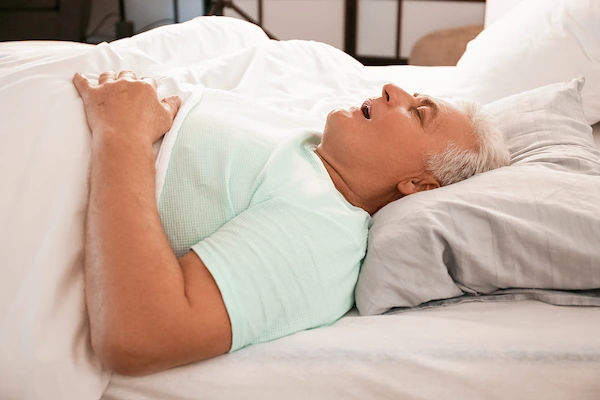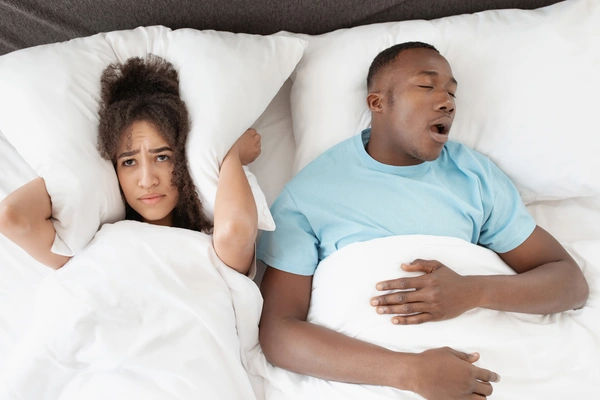10 Surprising Facts About Obstructive Sleep Apnoea
Discover 10 surprising facts about obstructive sleep apnoea that can help you understand, recognise, and manage this common sleep disorder.

Written by Dr. Mohammed Kamran
Reviewed by Dr. Rohinipriyanka Pondugula MBBS
Last updated on 13th Jan, 2026
.webp?tr=q-80,f-webp,w-350,dpr-2,c-at_max 700w)
Introduction
Obstructive Sleep Apnoea (OSA) is often dismissed as just loud, inconvenient snoring. But beneath the surface of those nighttime noises lies a serious medical condition with far-reaching consequences for your overall health. It's a disorder characterised by repeated episodes of complete or partial collapse of the upper airway during sleep, leading to breathing pauses and drastic drops in blood oxygen levels. While common symptoms like loud snoring and daytime fatigue are well-known, many surprising facts about OSA remain under the radar. This article will pull back the curtain on the hidden aspects of this condition, from who it affects to the unusual signs it presents. Understanding these surprising facts about obstructive sleep apnoea is the first step toward protecting your long-term health and reclaiming the restorative sleep your body desperately needs.
Redefining the "Typical" OSA Patient
The stereotype of a person with sleep apnoea is often an overweight, middle-aged man. While this demographic is at higher risk, this narrow view causes many cases to be missed.
Fact #1: You Don't Have to Be Overweight to Have Sleep Apnoea
It's true that excess weight is a significant risk factor, as it can add tissue around the airway. However, thin people can have sleep apnoea due to other anatomical reasons. A narrow airway, large tonsils, a recessed jaw, or a large tongue can cause obstructions regardless of body weight. This is why fit, athletic individuals can still suffer from severe OSA. Focusing solely on weight can lead to a dangerous delay in diagnosis.
Fact #2: Even Children and Fit Adults Can Be Affected
OSA does not discriminate by age. In children, it's often linked to enlarged tonsils and adenoids and can manifest as behavioural issues, poor school performance, and bedwetting, symptoms easily mistaken for ADHD. Similarly, otherwise healthy adults with specific facial bone structures are susceptible. This broadens the scope of who should be considered for screening.
Consult a Sleep Medicine Specialist for the best advice
The Silent Symptoms Beyond the Bedroom
OSA's impact extends far beyond the bedroom, creating a ripple effect of symptoms that you might never connect to a sleep disorder.
Fact #3: Waking Up to Pee at Night (Nocturia) is a Major Clue
Frequent nighttime urination, or nocturia, is a classic yet overlooked sign. When your breathing pauses, the heart receives stress signals, thinking there's a problem. This can cause the heart to release a hormone that tells the kidneys to reduce fluid volume, leading to an increased urge to urinate. If you're waking up multiple times a night to use the bathroom, OSA could be the culprit, not just a prostate issue or overhydration.
Fact #4: Morning Headaches and Jaw Pain Can Signal OSA
Waking up with a throbbing headache is common in OSA sufferers. These headaches are caused by the drop in oxygen and rise in carbon dioxide in the blood, which dilates blood vessels in the brain. Additionally, many people clench or grind their teeth (bruxism) in an attempt to reopen their airway, leading to jaw pain (TMJ), worn-down teeth, and facial soreness.
Fact #5: It's a Prime Suspect in Unexplained High Blood Pressure
If you have treatment-resistant high blood pressure, meaning it doesn't respond well to medication, sleep apnoea and high blood pressure are often linked. Each breathing pause creates a surge of stress hormones (like adrenaline), causing your blood pressure to spike. Over time, this leads to sustained hypertension, putting immense strain on your cardiovascular system, even during the day.
The Brain and Mood Connection
The brain is exceptionally vulnerable to the effects of sleep fragmentation and oxygen deprivation, leading to significant neurological and psychological consequences.
Fact #6: Sleep Apnoea Can Masquerade as Depression and Anxiety
The chronic fatigue and cognitive fog caused by OSA are often indistinguishable from symptoms of depression. The constant state of physiological stress can also trigger anxiety. Many patients are misdiagnosed with a primary mood disorder when the root cause is untreated sleep apnoea. Treating the OSA often leads to a dramatic improvement in mood and mental clarity.
Fact #7: It Directly Shrinks Your Brain's Gray Matter
Perhaps one of the most alarming facts is that studies using MRI scans have shown that people with severe OSA have a noticeable reduction in gray matter in brain regions responsible for memory, emotion, and executive function. This is likely due to the cumulative effect of oxygen deprivation. The good news? Evidence suggests that consistent CPAP treatment can help reverse some of this damage over time.
Surprising Causes and Aggravating Factors
Sometimes, the signs of a narrow airway are visible even when you're awake.
Fact #8: Your Tongue Scalloping Might Be Telling You Something
Look at your tongue in the mirror. Do you see wavy, scalloped indentations along the edges? This tongue scalloping occurs when the tongue is too large for the mouth and presses against the teeth during sleep (or even while awake). It's a strong visual indicator of a potential airway obstruction issue.
Fact #9: Allergies and Reflux Can Worsen OSA
Chronic nasal congestion from allergies can force you to breathe through your mouth, which positions the jaw and tongue in a way that narrows the airway. Furthermore, there's a strong bidirectional relationship between OSA and GERD (acid reflux). The pressure changes in the chest during apnoea episodes can suck stomach acid into the oesophagus, and the acid irritation can cause swelling in the airway, worsening apnoea.
Modern Diagnosis and Treatment Breakthroughs
The landscape of OSA management has evolved significantly, becoming more accessible and personalised.
Fact #10: Diagnosis No Longer Always Requires a Lab Sleep Study
While an in-lab sleep study (polysomnography) is the gold standard, home sleep apnoea tests are now a common and reliable first step for many. These compact devices you use in your own bed can effectively diagnose moderate to severe OSA, making the process much more convenient and less intimidating.
CPAP Isn't the Only Solution: Exploring Modern Alternatives
Continuous Positive Airway Pressure (CPAP) is highly effective but isn't the only option. For those who cannot tolerate it, alternatives include:
- Oral Appliance Therapy: Custom-fitted dental devices that reposition the jaw or tongue to keep the airway open.
- Positional Therapy: Wearable devices that gently vibrate to encourage you to sleep on your side if your apnoea is position-dependent.
- Inspire Therapy: A surgically implanted device that acts like a pacemaker for the tongue, stimulating the nerve to keep the airway clear during sleep.
If you suspect you have sleep apnoea based on these signs, consulting a sleep specialist is crucial. You can connect with an expert from Apollo24|7 to discuss your symptoms and explore diagnostic options, including home sleep tests.
Conclusion: Taking the Next Step Towards Restful Sleep
Understanding these surprising facts about obstructive sleep apnoea is empowering. It moves the conversation from a niche sleep issue to a central player in overall metabolic, cardiovascular, and neurological health. If any of these points resonated with you, whether it's the unexplained fatigue, the morning headaches, or the high blood pressure that medication can't control, it's worth paying attention. Ignoring OSA is like ignoring a check-engine light in your car; the problem won't go away and will likely lead to more severe and costly damage down the road. Taking action by speaking with a healthcare professional can lead to a diagnosis that transforms your health, your mood, and your quality of life.
Consult a Sleep Medicine Specialist for the best advice
Consult a Sleep Medicine Specialist for the best advice

Dr. Suresh G
General Physician/ Internal Medicine Specialist
25 Years • MBBS, MD
Bangalore
Apollo Clinic Bellandur, Bangalore
(225+ Patients)

Dr. Shiba Kalyan Biswal
Pulmonology Respiratory Medicine Specialist
18 Years • MBBS,MD,DM(AIIMS Delhi)
Gurugram
APOLLO SUGAR CLINICS GURUGRAM, Gurugram

Dr. Priya Sharma
Pulmonology/critical Care Specialist
9 Years • DM (PULMONARY MEDICINE), DNB, EDARM, MNAMS
Delhi
Apollo Hospitals Indraprastha, Delhi

Dr. Arjun Ramaswamy
Pulmonology Respiratory Medicine Specialist
9 Years • MD (RESPIRATORY MEDICINE), DM (PULMONARY MEDICINE, CRITICAL CARE AND SLEEP MEDICINE)
Mumbai
Apollo Hospitals CBD Belapur, Mumbai
(75+ Patients)
Dr Srinivas Rajagopala
Pulmonology Respiratory Medicine Specialist
20 Years • MBBS, MD (Int Med), DM (Pul & Crit Care), Fellowship in Lung Transplantation (Toronto)
Chennai
Apollo Cancer Speciality Hospital, Teynampet, Chennai
Consult a Sleep Medicine Specialist for the best advice

Dr. Suresh G
General Physician/ Internal Medicine Specialist
25 Years • MBBS, MD
Bangalore
Apollo Clinic Bellandur, Bangalore
(225+ Patients)

Dr. Shiba Kalyan Biswal
Pulmonology Respiratory Medicine Specialist
18 Years • MBBS,MD,DM(AIIMS Delhi)
Gurugram
APOLLO SUGAR CLINICS GURUGRAM, Gurugram

Dr. Priya Sharma
Pulmonology/critical Care Specialist
9 Years • DM (PULMONARY MEDICINE), DNB, EDARM, MNAMS
Delhi
Apollo Hospitals Indraprastha, Delhi

Dr. Arjun Ramaswamy
Pulmonology Respiratory Medicine Specialist
9 Years • MD (RESPIRATORY MEDICINE), DM (PULMONARY MEDICINE, CRITICAL CARE AND SLEEP MEDICINE)
Mumbai
Apollo Hospitals CBD Belapur, Mumbai
(75+ Patients)
Dr Srinivas Rajagopala
Pulmonology Respiratory Medicine Specialist
20 Years • MBBS, MD (Int Med), DM (Pul & Crit Care), Fellowship in Lung Transplantation (Toronto)
Chennai
Apollo Cancer Speciality Hospital, Teynampet, Chennai
More articles from Sleep Apnea
Frequently Asked Questions
Can sleep apnoea cause weight gain?
Yes, it can create a vicious cycle. OSA disrupts hormones that regulate appetite (leptin and ghrelin), increasing cravings for high-calorie foods. The severe fatigue also reduces motivation for physical activity, making weight loss difficult.
I'm a woman, and my snoring isn't loud. Could I still have OSA?
Absolutely. Signs of sleep apnoea in women are often subtler than in men. Women are more likely to report symptoms like fatigue, insomnia, morning headaches, mood changes, and restless legs, rather than loud, classic snoring. This leads to underdiagnosis in women.
Is sleep apnoea a permanent condition?
Not necessarily. While often chronic, the severity can be significantly reduced. Weight loss can sometimes resolve OSA if it was a primary cause. For others, it's a manageable condition with treatments like CPAP or oral appliances, similar to how glasses correct vision.
What's the difference between simple snoring and sleep apnoea?
Simple snoring is the sound of partially obstructed breathing. Sleep apnoea involves complete pauses in breathing (apnoeas) or significant reductions in airflow (hypopnoeas), followed by gasps or choking sounds as the brain wakes you up to breathe. This cycle of arousal is what causes the damaging health effects.
Are there any simple lifestyle changes that can help mild sleep apnoea?
For mild cases, positional therapy (sleeping on your side), weight loss, avoiding alcohol before bed, and managing nasal allergies can significantly reduce symptoms. However, these should be discussed with a doctor to ensure they are sufficient.


.webp)